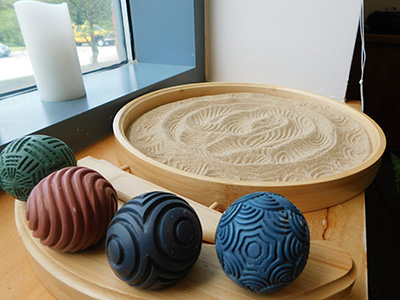Supporting Student Wellness at Carroll

Student wellness has become a top priority for colleges and universities across the country. With the increased recognition of mental health issues, daily stressors, and the need for a balanced lifestyle, educational institutions are investing in comprehensive wellness programs to support their students.
College students face numerous challenges, including academic pressures, social adjustments, and financial burdens. These can negatively impact their mental and physical health, leading to anxiety, depression, and burnout.
“Student wellness is important both individually and globally,” said April Herring, Senior Director of Advising and Retention at Carroll. “We know that mental health challenges are preventing students from coming to college and also preventing them from excelling.”
To address these challenges, Carroll Community College offers several wellness resources and activities that can benefit students’ lives in a variety of ways. These initiatives are designed to promote their physical, mental, and emotional wellbeing, providing students with the essential tools and services they require to succeed both academically and personally.
“Student wellness focuses on a person holistically—their mental, physical, spiritual, financial, and emotional wellbeing,” said DaVida Anderson, Director of Student Care and Integrity at Carroll. “It’s vital that our institution continues to make it a part of our strategic initiative and mission to ensure we’re not just focusing on one aspect of students, but the whole person.”
Our job here at the College is to walk side by side—not in front, not behind—but right beside a student from the time they get here until they graduate and walk across that stage.
Wellness Resources at Carroll
Carroll offers a range of student wellness services and activities designed to support both their mental and physical health, making them better able to succeed in all areas of campus life.
- Mental Health Services: Acknowledging the significance of mental health support in fostering student wellness, Carroll provides students with referrals and resources to succeed in college and beyond.
“COVID brought conversations about mental health to the forefront,” said Anderson. “It made it safer for those who were maybe uncomfortable with talking about mental health before to engage in those conversations.”
The College offers free, confidential support through TimelyCare, a virtual health and wellbeing platform, available to students 24/7. The program “provides students immediate access to a clinical professional through Talk Now,” explained Anderson. “All of our credited students get six free counseling sessions, and they can also access coaching and self-guided modules to support their wellbeing.”
TimelyCare also offers a Self-Care Journey option, giving students anytime-access to short videos, interactive guides, and articles from experts on topics such as managing stress, navigating relationships, and healthy eating.
- Wellbeing Committee: The Wellbeing Committee at Carroll consists of faculty, staff, and students, whose mission is to promote student-centered resources to make the College a safe place for all students and develop a healthy approach to living.
Each member serves on one of the following subcommittees: Wellness; Drugs, Alcohol, and Opioids; and Interpersonal Violence Prevention. Each subcommittee meets once a month to discuss and plan on-campus events, and work with community partners to develop workshops, virtual simulations, and activities to raise awareness of the resources the College and community partners have available for students.
Wellness events have included:
- Well-MART: A mini-health market where students could get information and tips on wellness, as well as engage in activities providing possibilities for more healthful, joyful, and peaceful living.
- Hands Are the Ambassadors: A group art project/relaxation space dedicated to the idea of the hand as the ambassador for mind, body, heart, and soul. Activities featured a body-mapping art experience, hand-focused reflexology, and other wellness-oriented activities.
- Thanksgiving Self-Care Student Wellness Packages: Participants explored methods to assess, cope with, and manage holiday stress. They were encouraged to practice self-care, supported by receiving food items and toys to help reduce anxiety.
- KPETS Therapy Dogs: Certified therapy dogs, accompanied by their volunteer handlers, visited campus to offer students some much-needed stress relief before final exams.

- Relaxation Station: “We had a student come into the advising office who was having a panic attack,” related April Herring. “She indicated that when she has a panic attack, she would do it in the bathroom, and that struck me as very not ideal.”
Herring’s solution to this was opening a Relaxation Station, a dedicated room on campus where students could unwind, helping them restore focus, reduce anxiety, and enhance their overall state of mind. The softly lit, quiet space also features a massage chair, weighted blankets, fidget toys, a white noise machine, a Zen garden, and more.
“This gives students a safe place to relax and spend some time centering, grounding, and getting themselves back online, so to speak,” Herring said. - Spirituality Room: Practicing one’s spirituality fosters personal growth, inner peace, and a sense of purpose, and can help students navigate academic and life challenges with resilience and clarity. The Spirituality Room is a safe space for students to practice their faith on campus, and features various faith-based resources such as mats, books, etc.
- Fitness Center: Physical activity is a key component of student wellness. Regular exercise not only improves physical health but also boosts mood, enhances cognitive function, and reduces stress. Carroll’s Jack & Beth Tevis Fitness Center features a variety of exercise equipment for cardio, strength training, and more. The center is open to currently enrolled credit students and is free to use.
Making Wellness a Priority
Student wellness resources and activities at colleges like Carroll play a vital role in promoting the overall wellbeing of students. “For a college or university to create an environment of wellbeing, it has to go beyond words. It has to be part of the actions and the fabric of that institution,” DaVida Anderson said.
From mental health resources to fitness activities, Carroll has indeed created supportive environments for its students that foster resilience, self-awareness, and holistic development.
“Whatever is bothering a student doesn’t stop when they get to class. It stays with them,” Anderson continued. “Our job here at the College is to walk side by side—not in front, not behind—but right beside a student from the time they get here until they graduate and walk across that stage.”
As the importance of student wellness continues to be recognized, Carroll will undoubtedly expand and innovate its already exceptional wellness initiatives, ensuring students have the tools they need to thrive here.